How To Say Thank You In Arabic In 7 Ways Plus Response
Advertisements
Everyone loves to give good news, and to say thank you is about the best you can deliver. So, whether you’re saying thank you for a new job, great service you’ve received, or simply because you appreciate another person, we’ll help you to learn how to say thank you in Arabic.
Sometimes a simple Shukran just isn’t enough to show your gratitude. Learn many other ways to say “thank you” in Arabic and how to show your appreciation.
How To Say Thank You In Arabic?
In Arabic, the phrase for thank you is “شكرا” (shukran). This is a very common phrase that is used to express gratitude in a variety of situations, from receiving a gift or favor to simply expressing appreciation for someone’s presence or help. It comes from the root verb shakara (شكر) meaning “to thank”.
As a common response, reply to “shukran” with “al-’awfoo” (العفو) or “‘af-waan” (عفواً)—these phrases translate to “you’re pardoned” but mean “you’re welcome” or “no problem.”
Another way to reply can be “ahlan wa sahlan (أهلا و سهلا) which literally means you are welcome.
Advertisements
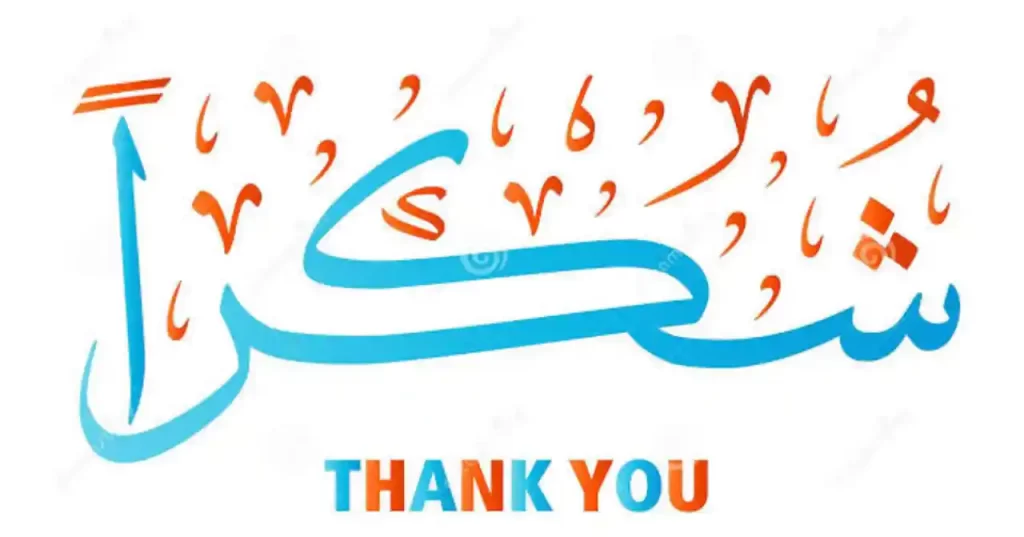
It is also important to note that there are a few different ways to say thank you in modern standard Arabic, depending on the level of politeness and formality desired.
Shukran lak شكراً لك
You can make a little more formal to Shukran by adding another extension, which literally means (to you).
Shukran lak شكراً لك is used to say ‘thank you’ in a formal way. The pronunciation of the word differs depending on the gender and number of the addressee.
Below is a table of the way we say thank you along with transliteration.
| Addressee | Arabic | Transliteration |
| Masculine singular | شكراً لكَ | Shukran laka |
| Feminine singular | شكراً لكِ | Shukran laki |
| Two males or females | شكراً لكما | Shukran lakuma |
| Three or more males | شكراً لكم | Shukran lakum |
| Three or more females | شكراً لكنَّ | Shukran lakunna |
Read Arabic Sports Vocabulary (100+ Words With Translation)
Advertisements
Shukran jazelan شكراً جزيلاً
If shukran does not adequately express your gratitude, you can use shukran jazelan. Adding jazelan, which means ‘a lot,’ to this expression will enhance it.
So using the phrase shukran jazelan is equivalent to saying ‘thanks a lot’. It is more commonly used in formal situations, such as when writing a letter or in a business setting.
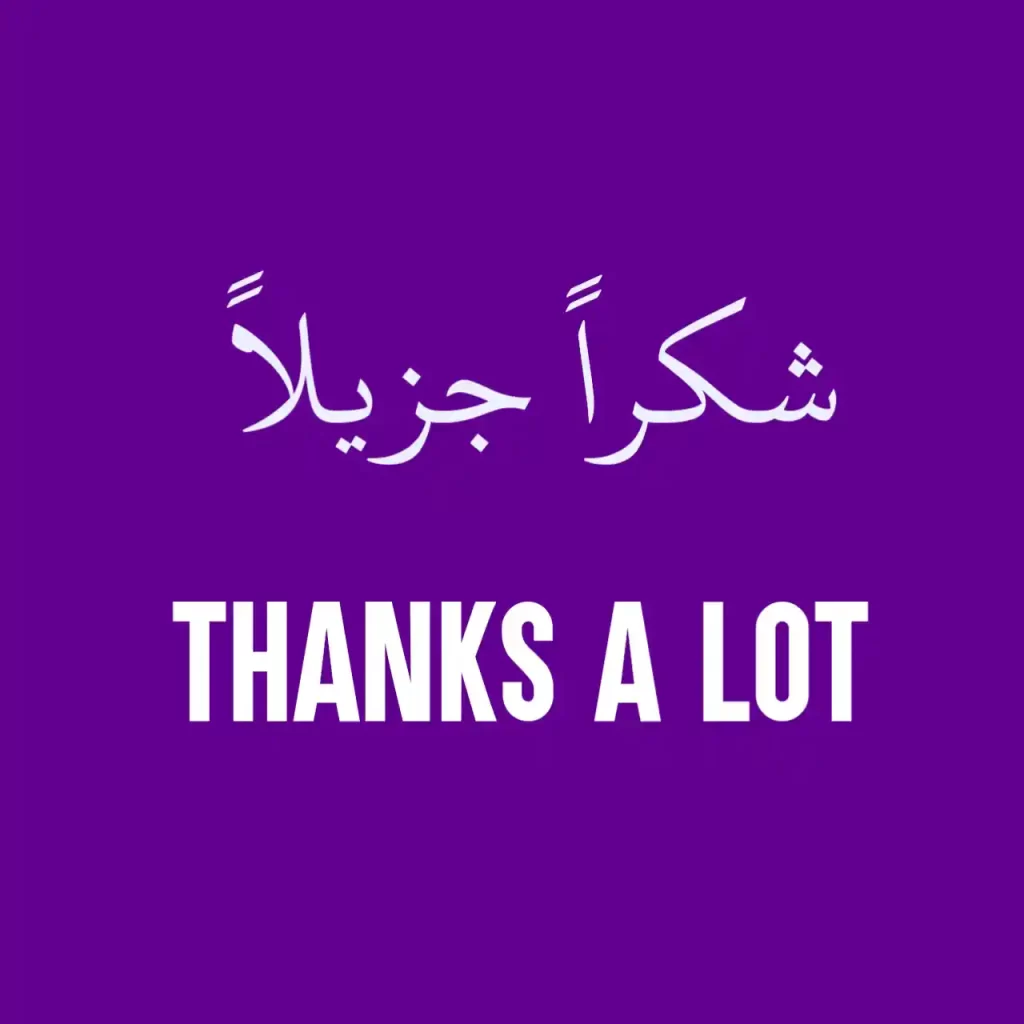
Ashkuraka أَشْكُرُك
Ashkuraka أَشْكُرُك meaning I thank you is used in all Arab countries and understood among all Arab dialects. Even though it’s one quick comment, it’s used in a formal context. It is a commonly used word in formal situations.
Note that ashkuraka is used for second person male singular, its conjugation is shown in the table below.
| Addressee | Arabic | Transliteration |
| Masculine singular | أشكركَ | Ashkuroka |
| Feminine singular | أشكركِ | Askuroki |
| Two males or females | أشكركما | Ashkurokuma |
| Three or more males | أشكركم | Ashkorokum |
| Three or more females | أشكركنَّ | Ashkurokonna |
Baraka Allahu Feek بارك اللَّه فيك
Baraka Allahu Feek بارك اللَّه فيك means May Allah bless you, which in many situations can be used to say thank you very much.
It shows gratitude and expresses and common among Muslims in all Arab-speaking countries. “Baraka” translates to “blessing” and captures the good will you feel for a thoughtful person.
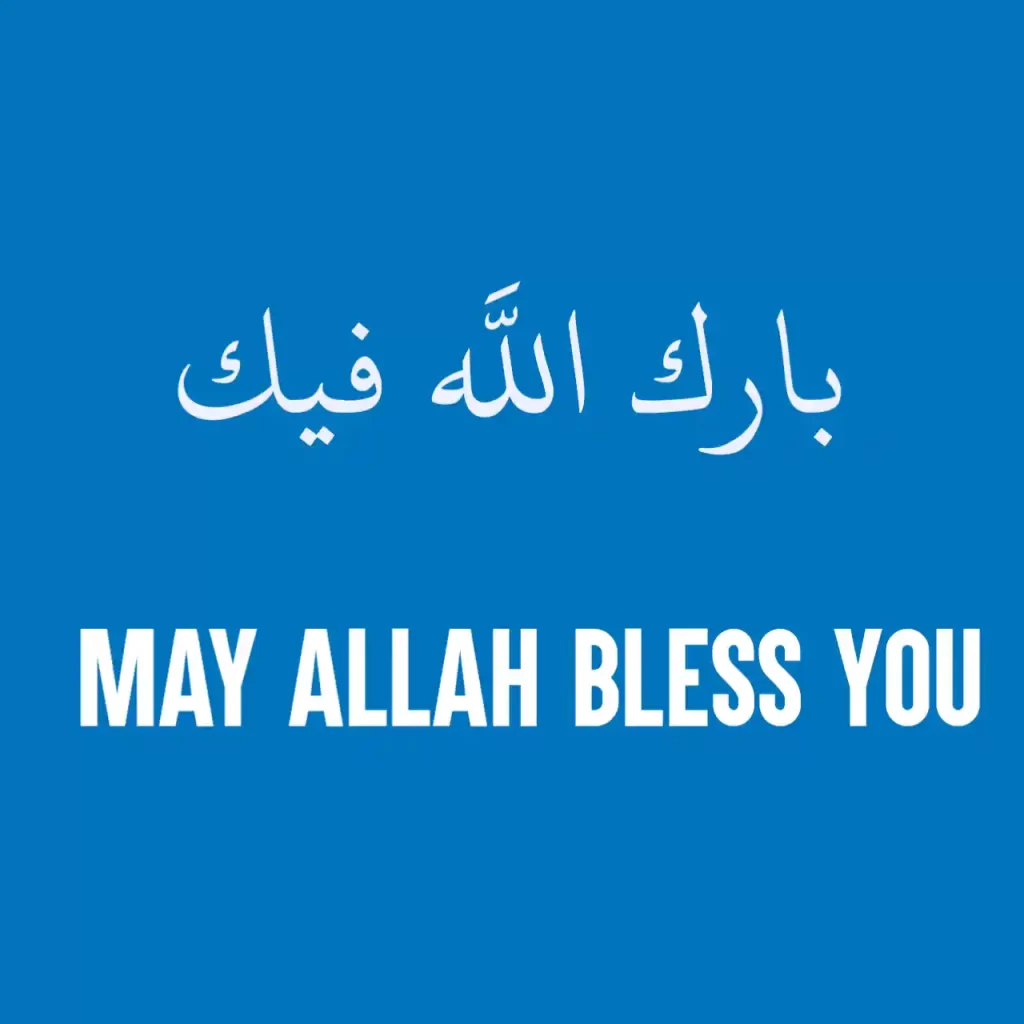
The phrase differs slightly depending on who you’re speaking to. The table below summarized the ways you can say ‘may Allah bless you’.
| Addressee | Arabic | Arabic Transliteration |
| Masculine singular | بارك الله فيكَ | Barak Allahu feeka |
| Feminine singular | بارك الله فيكِ | Barak Allahu feeki |
| Two males or females | بارك الله فيكما | Barak Allahu feekuma |
| Three or more males | بارك الله فيكم | Barak Allahu feekum |
| Three or more females | بارك الله فيكنَّ | Barak Allahu feekunna |
A common reply can be:
- Wa feeka (وفيك) for male singular
- Wa feeka (وفيك) for female singular
- Wa feeka (وفيكما) for two males/ females
- Wa feeka (وفيكم) for plural masculine
- Wa feeka (وفيكنّ) for plural feminine
Thank You Very Much in Arabic
The Arabic phrase for thank you very much is شُكْراً كْتير and pronounced shoukran Kathir. It is another way to express gratitude in Arabic. This is a more formal way of saying thank you very much, and you use this phrase when you are very grateful to the person.
Jazaka Allahu Khayran جزاك الله خيراً
Jazak Allahu khayran (جزاك الله خيراً) is another way to say “thank you” in Arabic. It literally means “may Allah reward you with good.” This phrase is often used to show deep appreciation or gratitude, and is typically used in more formal situations.
The word جزاك is pronounced according to the addressee as shown below.
| Addressee | Arabic | Transliteration |
| Masculine singular | جزاكَ الله خيراً | Jazaka allahu khayran |
| Feminine singular | جزاكِ الله خيراً | Jazaki allahu khayran |
| Two males or females | جزاكما الله خيراً | Jazakoma allahu khayran |
| Three or more males | جزاكم الله خيراً | Jazakom allahu khayran |
| Three or more females | جزاكُنَّ الله خيراً | Jazakonna allahu khayran |
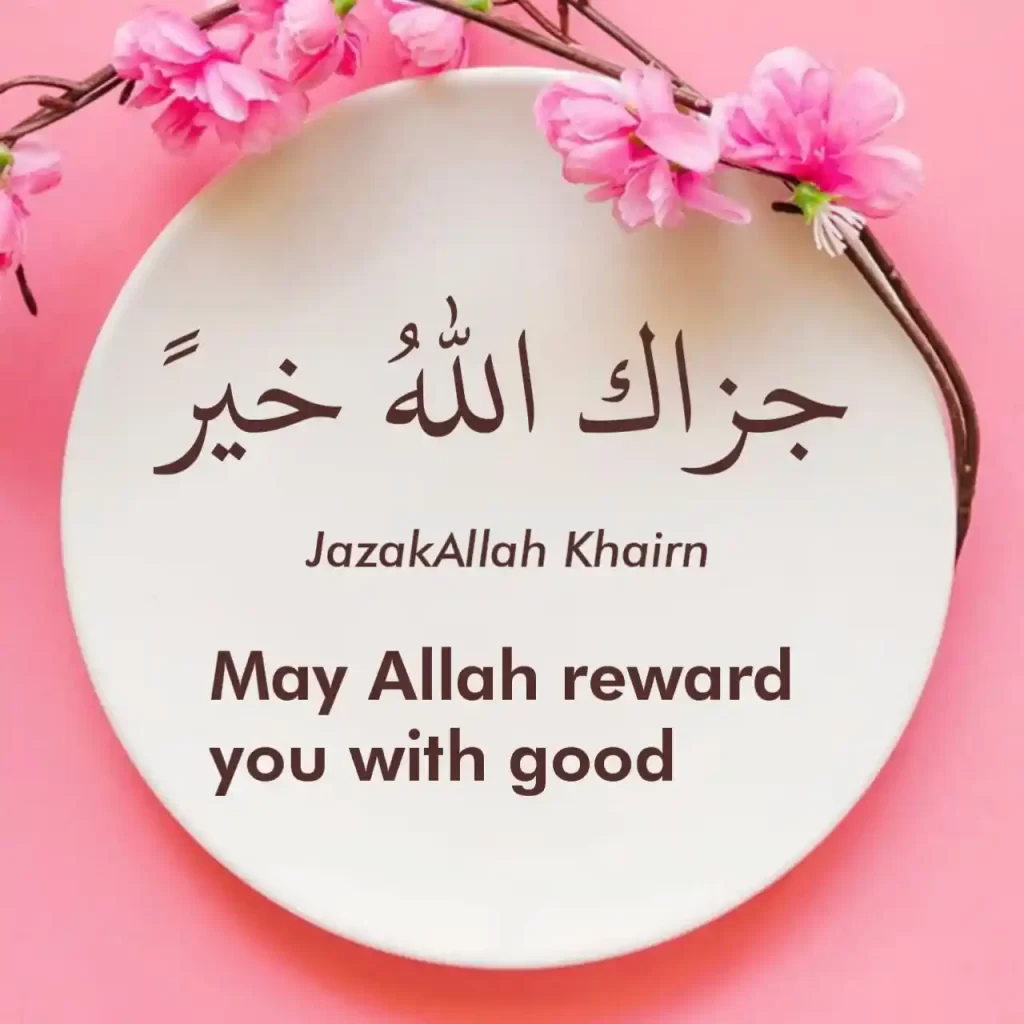
How To Respond To JazakAllahu Khair?
To summarize on how to respond to JazakAllahu Khairn for male, female and plural, refer to the table below.
| Arabic | English | Person |
| وَإِيَّاكَ | And you too | Male |
| وَإِيَّاكِ | and you too | Female |
| وَإِيَّاكم | and you too | Male (plural) |
| وَإِيَّاكن | and you too | Female (plural) |
Thank You Allah In Arabic
The Arabic word for thank you Allah is الحمدلله pronounced as Alhamdulillah. It simply means all praises are due to Allah.
| English | Arabic |
| Thank you | شكراً لك |
| Thank you so much | شكراً جزيلاً لك |
| Thank you very much | شكراً جزيلاً لك |
| Thanks | شكراً |
| Thanks a lot | شكراً كثيراً |
| Thanks a million | مليون شكرا |
| I appreciate your consideration/ guidances/ help/ time. | أقدر اهتمامك/ توجيهاتك/ مساعدتك/ وقتك |
| I sincerely appreciate | أنا أقدر حقاً |
| My sincere appreciation/gratitude/thanks | مع خالص تقديري/ امتناني/ شكري |
| Thank you for your guidance | شكرا لتوجيهك لي |
| Thanks for explaining this to me | شكرا لتفسير هذا لي |
| I’m grateful for your assistance | أنا ممتن لمساعدتكم |
| Thank you for your prompt reply | شكرا لردكم السريع |
| Thank you for contacting me | شكرا لاتصالك بي |
| Thank you for the gift | شكرًا لك على الهدية |
| Thank you for connecting with me | شكرا لك على التواصل مع لي |
| Thank you for spending time with me. | شكرا لك على قضاء الوقت معي |
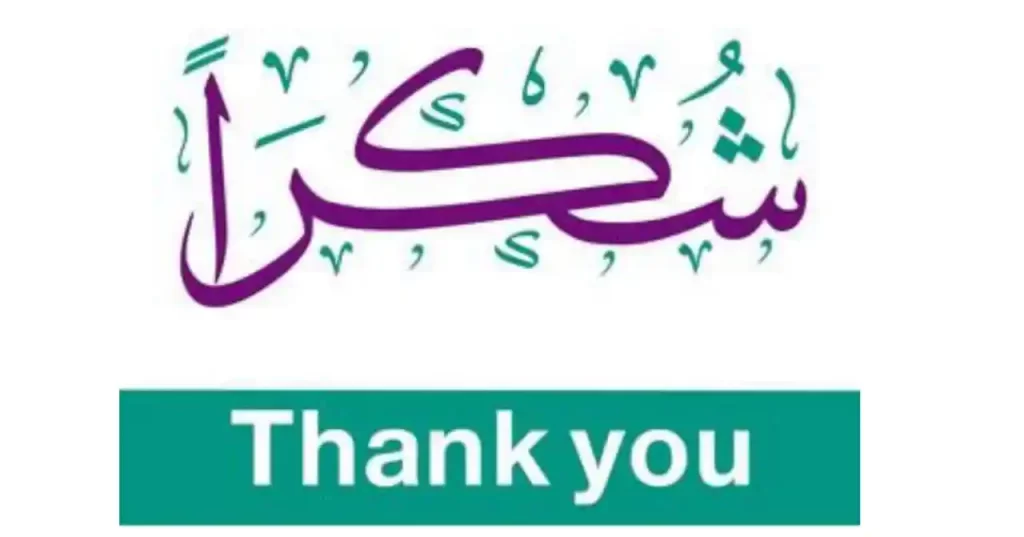
Response To Thank You in Arabic
There are numbers of ways to respond to thank you in Arabic language, the most common responses are:
You Are Welcome In Arabic
The modern standard Arabic way to say you are welcome على الرحب والسعة and the pronunciation is ala alrahbe was-se’aa, which translates into “you are welcome”.
That is a very classical way to put it. It is not used in everyday life though. You may read it in a book, but you can’t rely on it for a street conversation.
Another response that is also a little formal yet more common, especially in Egypt, is العفو (Al afwu) or عفوًا (A’fwa’an).
They both literally mean “to pardon/forgive”. In this context, though, they are intended as “don’t mention it”.
It is also worth noting that there are many other phrases in Arabic dialect that can be used to express gratitude, depending on the context and the relationship between the speaker and the person being thanked.
Here is a list of other phrases for thank you response in Arabic;
| English | Arabic |
| You are welcome in Arabic | على الرحب |
| No problem in Arabic | لا مشكلة |
| The pleasure is all mine. | من دواعي سروري |
| Do not worry in Arabic | لا تقلق |
| It is my duty in Arabic | كان هذا واجبي |
| Do not say that in Arabic | لا تقل هذا |
| Any time in Arabic | في أي وقت |
| Anything for you | أي شيء لك |
| Happy I could be here for help. | سعيد لأني استطعت المساعدة |
| Don’t mention it in Arabic | لا تذكر هذا. |
| It is my pleasure in Arabic | إنه من دواعي سروري |
| Glad to help in Arabic | مسرور للمساعدة |
In general, it is always a good idea to use words of gratitude when interacting with others in Arabic, as expressing thanks is a sign of respect and appreciation that is highly valued in many Arabic-speaking cultures.
Conclusion
Whether you are thanking someone for a simple favor or expressing deep gratitude for their support and help, using the right words and phrases can go a long way towards building stronger relationships and creating a positive, supportive environment.
I hope this information helps you learn how to say “thank you” in Arabic. Whether you’re traveling to an Arabic-speaking country or just want to broaden your language skills, learning how to express gratitude is an important part of building relationships and making connections with others.
Advertisements


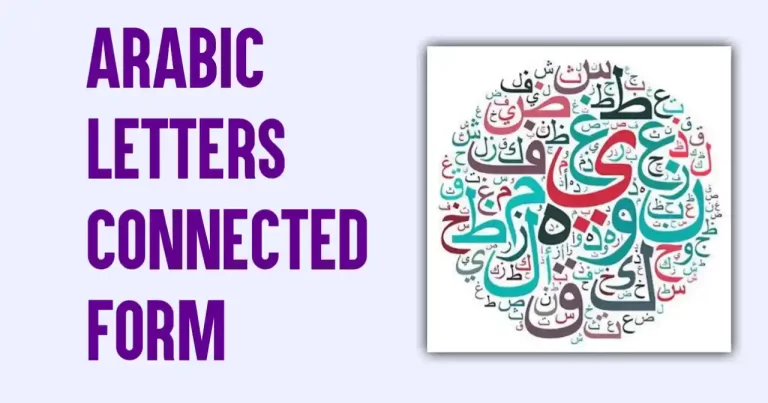
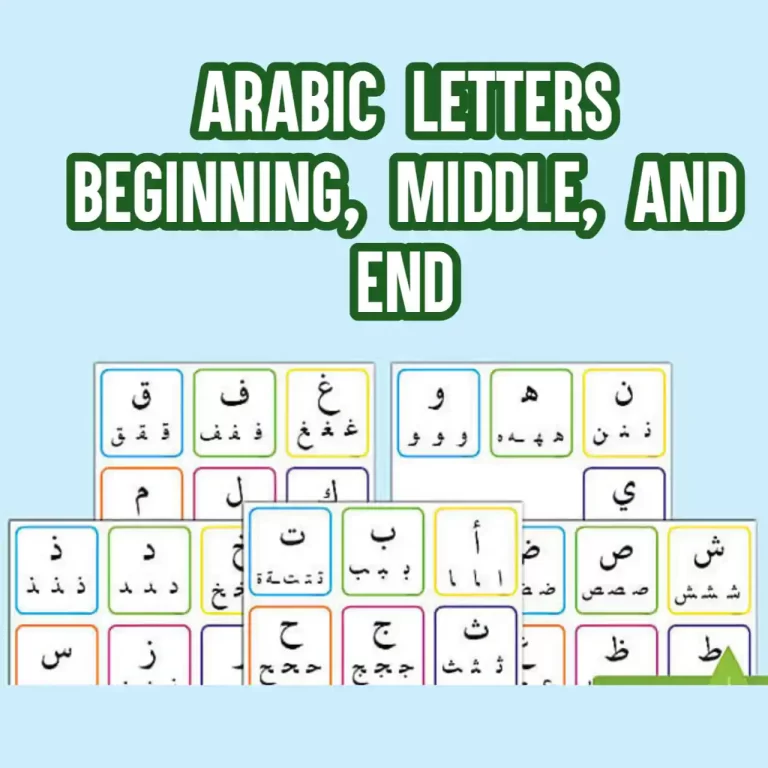
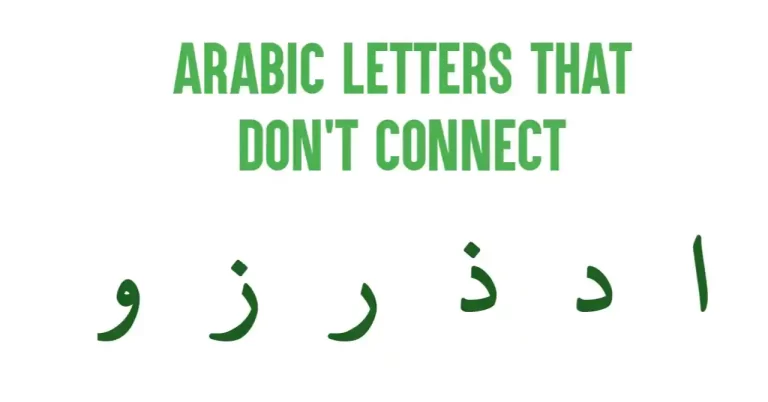
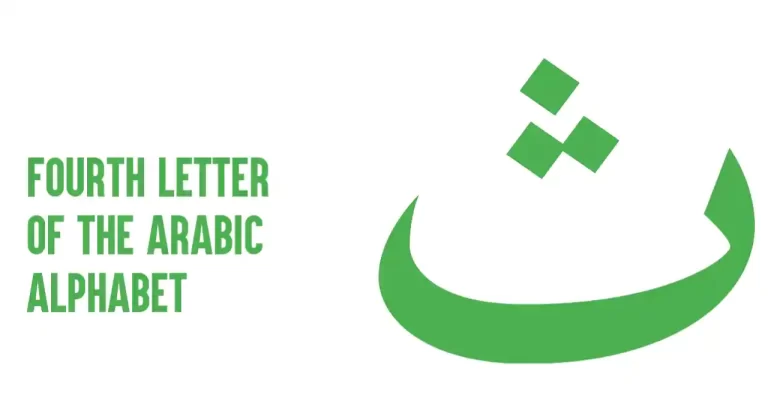
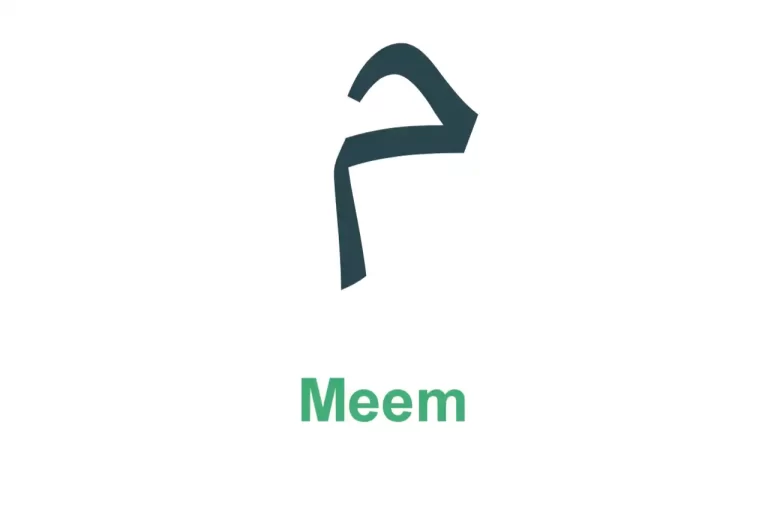
One Comment